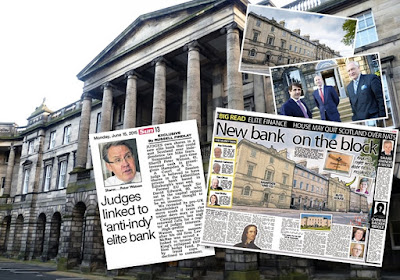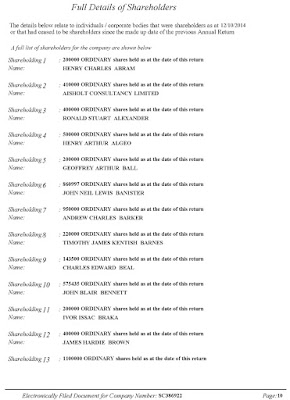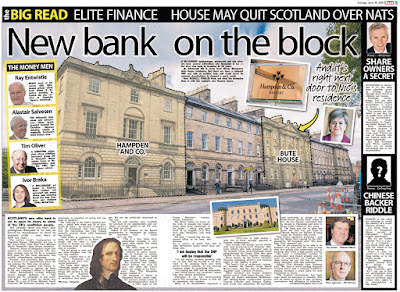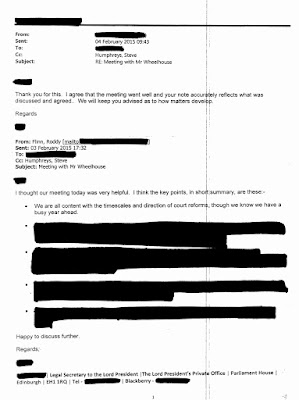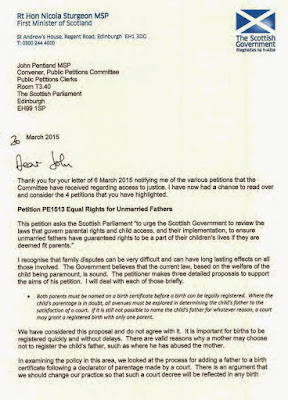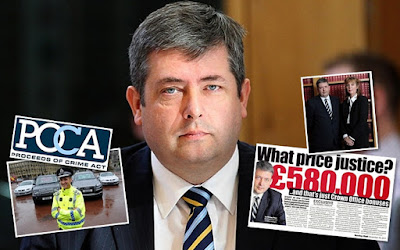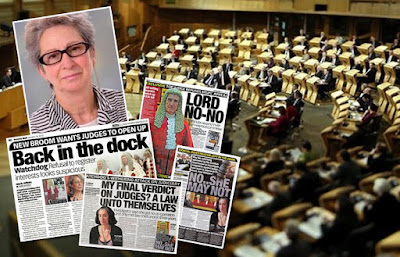 New Judicial Complaints Reviewer to face Holyrood. SCOTLAND’S new Judicial Complaints Reviewer (JCR) will appear before the Scottish Parliament’s Public Petitions Committee tomorrow, Tuesday 23 June, to give evidence on her support for a register of judicial interests.
New Judicial Complaints Reviewer to face Holyrood. SCOTLAND’S new Judicial Complaints Reviewer (JCR) will appear before the Scottish Parliament’s Public Petitions Committee tomorrow, Tuesday 23 June, to give evidence on her support for a register of judicial interests.
Gillian Thompson OBE – former head of the Accountant in Bankruptcy (AIB) who has held the post of JCR since summer 2014 – replacing Moi Ali - Scotland’s first ever Judicial Complaints Reviewer who stood down last year due to a lack of regulatory power - is expected to continue support for a proposal calling for judges to be required to declare their vast wealth and secretive links to business, as called for in Petition PE1458: Register of Interests for members of Scotland's judiciary.
The judicial transparency proposal calls for the creation of a single independently regulated register of interests containing information on judges backgrounds, their personal wealth, undeclared earnings, business & family connections inside & outside of the legal profession, offshore investments, hospitality, details on recusals and other information routinely lodged in registers of interest across all walks of public life in the UK and around the world.
The petition has cross party support from MSPs who backed a motion urging the Scottish Government to create a register of judicial interests at Holyrood on 7 October 2014 - reported along with video footage and the official record, here: Debating the Judges.
Writing in a letter to the Public Petitions Committee in January, Judicial Complaints Reviewer Gillian Thompson backed calls to make judges more accountable on their secretive interests.
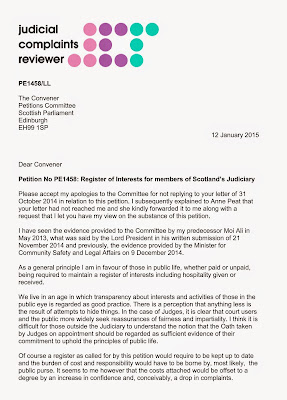 Gillian Thompson told MSPs: “As a general principle I am in favour of those in public life, whether paid or unpaid, being required to maintain a register of interests including hospitality given or received.”
Gillian Thompson told MSPs: “As a general principle I am in favour of those in public life, whether paid or unpaid, being required to maintain a register of interests including hospitality given or received.”
“We live in an age in which transparency about interests and activities of those in the public eye is regarded as good practice. There is a perception that anything less is the result of attempts to hide things. In the case of Judges, it is clear that court users and the public more widely seek reassurances of fairness and impartiality. I think it is difficult for those outside the Judiciary to understand the notion that the Oath taken by Judges on appointment should be regarded as sufficient evidence of their commitment to uphold the principles of public life.”
“Of course a register as called for by this petition would require to be kept up to date and the burden of cost and responsibility would have to be borne by, most likely, the public purse. It seems to me however that the costs attached would be offset to a degree by an increase in confidence and, conceivably, a drop in complaints.”
JCR Gillian Thompson’s backing for Petition PE1458: Register of Interests for members of Scotland's judiciary comes after Moi Ali - Scotland’s first ever Judicial Complaints Reviewer – quit her role as JCR after describing the job as “window dressing” during an evidence session with MSPs in September 2013, reported along with video coverage here: As Scotland’s top judge battles on against transparency, Judicial Complaints Reviewer tells MSPs judges should register their interests like others in public life
JCR Moi Ali gives evidence to Scottish Parliament on a proposed Register of Judicial Interests
The full written report on the eye opening 2013 evidence session with Moi Ali and the Scottish Parliament’s Public Petitions Committee was published here : Evidence from Scotland’s Judicial Complaints Reviewer Moi Ali to Public Petitions Committee on Petition 1458 Register of Interests for Scotland’s Judiciary
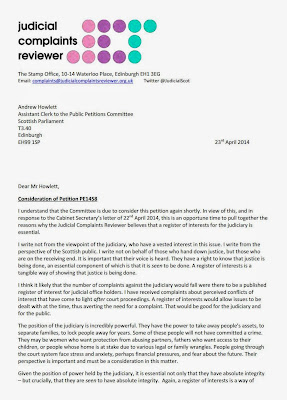 Judicial Complaints Reviewer Moi Ali backed register of judicial interests: A further letter of support from Moi Ali while she held the post of Judicial Complaints Reviewer told MSPs of the “incredibly powerful” nature of the judiciary and why a register of judicial interests would help judicial transparency and public confidence in the justice system.
Judicial Complaints Reviewer Moi Ali backed register of judicial interests: A further letter of support from Moi Ali while she held the post of Judicial Complaints Reviewer told MSPs of the “incredibly powerful” nature of the judiciary and why a register of judicial interests would help judicial transparency and public confidence in the justice system.
Moi Ali said: “I write not from the viewpoint of the judiciary, who have a vested interest in this issue. I write from the perspective of the Scottish public. I write not on behalf of those who hand down justice, but those who are on the receiving end. It is important that their voice is heard. They have a right to know that justice is being done, an essential component of which is that it is seen to be done. A register of interests is a tangible way of showing that justice is being done.”
“I think it likely that the number of complaints against the judiciary would fall were there to be a published register of interest for judicial office holders. I have received complaints about perceived conflicts of interest that have come to light after court proceedings. A register of interests would allow issues to be dealt with at the time, thus averting the need for a complaint. That would be good for the judiciary and for the public.”
“The position of the judiciary is incredibly powerful. They have the power to take away people’s assets, to separate families, to lock people away for years. Some of these people will not have committed a crime. They may be women who want protection from abusing partners, fathers who want access to their children, or people whose home is at stake due to various legal or family wrangles. People going through the court system face stress and anxiety, perhaps financial pressures, and fear about the future. Their perspective is important and must be a consideration in this matter.”
“Given the position of power held by the judiciary, it is essential not only that they have absolute integrity but crucially, that they are seen to have absolute integrity. Again, a register of interests is a way of demonstrating that a judicial office holder is impartial and has no vested interest in a case –financially, through family connections, club/society membership or in any other way. Conversely, the refusal to institute a register of interests creates suspicion that in turn undermines judicial credibility. So once more, a register of interests is good for the judiciary and good for the public.”
Gillian Thompson’s appearance before MSPs at Holyrood follows a secret meeting between Scottish Ministers and Lord President Lord Gill - who demanded proposals on requiring judges to declare their interests - be halted.
The secret meeting between Legal Affairs Minister Paul Wheelhouse and Scotland's now retired top judge Lord President Lord Brian Gill (73) and his aides was held in February - to discuss joint efforts between the Scottish Government and senior judicial figures to combat a long running Scottish Parliament investigation into proposals to increase transparency of the judiciary - Petition PE1458: Register of Interests for members of Scotland's judiciary.
The existence of the secret get together between Scottish Government Ministers and judges desperate to conceal their vast and varied interests from the public - only came to light in a letter of intervention from Scotland’s First Minister Nicola Sturgeon to the Scottish Parliament’s Public Petitions Committee at the end of March.
NEW JCR SCRUTINISED REGISTERS OF INTEREST FOR COURT STAFF:
Diary of Injustice previously reported on concerns regarding hospitality involving Scottish Court Service employees where the former AIB Chief was asked by the Scottish Court Service to investigate reports of irregularities in hospitality given to court staff. The request for the investigation came after the SCS received Freedom of Information requests regarding hospitality in the courts, prompting concerns some staff may have accepted gifts or hospitality but failed to register.
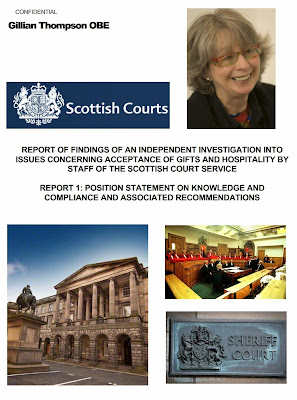 Report said SCS Registers were insufficient, and Court staff involved in private gain failed to declare. Gillian Thompson’s Report on Hospitality & Gifts in the SCS stated: “The information currently captured on the registers is insufficient to provide assurance that staff are using their common sense and considering issues such as conflict of interest.
Report said SCS Registers were insufficient, and Court staff involved in private gain failed to declare. Gillian Thompson’s Report on Hospitality & Gifts in the SCS stated: “The information currently captured on the registers is insufficient to provide assurance that staff are using their common sense and considering issues such as conflict of interest.
Ms Thompson went on to recommend the “SCS should revise the Policy on Acceptance of Gifts, Rewards and Hospitality to ensure that it is fit for purpose for all staff, taking account of the various roles performed within SCS. It may also be time to revisit the levels of value for gifts and hospitality.”
The former AIB’s report also revealed court staff were using their positions to earn money privately from their links with lawyers and law firms operating in courts, stating “Several staff raised the issue of sheriff clerks who carry out extrajudicial taxations and private assessments and who personally benefit financially from these activities.”
Ms Thompson’s report roundly condemned this practice, stating: “Not only is it inappropriate in terms of the civil service code requirements for staff who are public servants to be able to receive private gain from their employment it is also highly divisive when other staff see such benefits being derived from simply being in the right post of Auditor of Court within the Sheriff Courts.”
Ms Thompson recommended in her report the “SCS should bring the practice of sheriff clerks profiting privately from their employment by SCS to an end as quickly as possible”.
Previous articles on the lack of transparency within Scotland’s judiciary, investigations by Diary of Injustice including reports from the media, and video footage of debates at the Scottish Parliament’s Public Petitions Committee can be found here : A Register of Interests for Scotland's Judiciary
